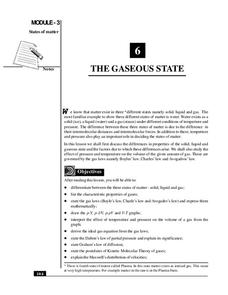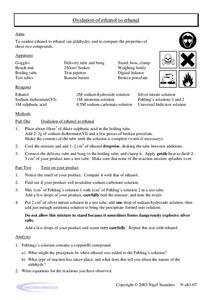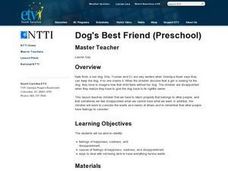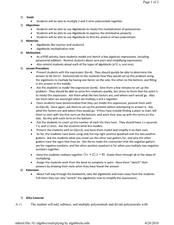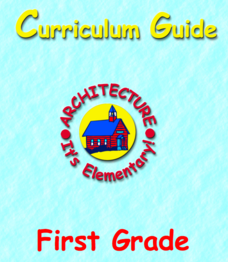National Institute of Open Schooling
The Gaseous State
Sixth in a series of 36, this lesson focuses on gases and their behavior in given situations. Learners review the states of matter and then focus on gases, specifically learning Boyle's, Charles's, Avogadro's Laws, Dalton's, and Graham's...
LABScI
Atomic Structure and the Periodic Table of Elements: The Secret Agent Lab
Food always gets attention! Model atomic structure using fruit loops to represent the subatomic particles. After building models, scholars create ionic bonds using their models. Finally, they use these concepts to create a periodic table.
Mathematics Vision Project
Module 10: Matrices Revisited
A matrix is just a fancy way of making a table. Young scholars explore operations with matrices with the first lessons in the final module of a 10-unit Algebra II series. After adding, subtracting, and multiplying matrices, pupils use...
California Academy of Science
Plants: Hanging Tough
Learning about the rainforest can be more fun than you think. The class discusses vocabulary-in-context as they cut cardboard boxes, destined to become part of a rainforest model. Small groups of children color, cut, and construct...
Los Angeles County Office of Education
Assessment For The California Mathematics Standards Grade 4
Have scholars show what they know with a 20-page assessment aligned to the California State Standards. The test covers concepts such as large and whole numbers, all four mathematical operations, fractions, decimals, geometric figures,...
National Institute of Open Schooling
Nomenclature and General Principles
Carbon, the base for all organic compounds, exists in nature in its purest form as graphite or diamonds. The 25th lesson in a series of 36 teaches pupils the nomenclature of organic compounds. Learners read about how to use the IUPAC...
Cornell University
Nano What?
The size of a nanoparticle is difficult for pupils to grasp. A hands-on experiment is designed to give your classes perspective. Learners analyze different sports drinks for the content of electrolytes as an introduction to nanoscale....
Curated OER
Indiana Courts: How Do They Work?
Students identify the branches of Indiana's judicial system and determine the differences between the different courts and different types of cases. Students create a flow chart showing how a court case works its way through the legal...
Curated OER
What Is Special About Polyethylene Food Storage Bags?
Students participate in an investigation in which they compare a polyethylene bag designed for recycling or disposal with a polyethylene food storage bag. Students use hexane to determine the differences between the low density...
Curated OER
Investigation - Who is Right?
Third graders investigate two mathematic scenarios and determine which is correct. They compare adding columns and places (such as the tens place, hundreds place, and so on) and familiarize themselves with how to add larger numbers.
Curated OER
WS 2.5 Dimensional Analysis
Science students apply dimensional analysis to relate quantities in six different problems. They consider the cost of steak, a young man's growth rate, a medicine prescription, fuel efficiency, and more. This worksheet is a great way to...
Curated OER
Oxidation of Ethanol to Ethanal
Here is a laboratory exercise where chemistry masters carry out an oxidation reaction to change ethanol into ethanal. They compare the original alcohol to the resulting aldehyde by forming a precipitate. Definitely aimed at learners...
Curated OER
Dog's Best Friend
Learners learn about and identify feelings of happiness, sadness and disappointment. In this feelings lesson, students have a show and tell time about their pets and discuss how it would feel if they lost their pet. Learners watch a...
Curated OER
Students Multiply Polynomials
Factor polynomial functions that have two and three terms. Using Algeblocks, your class will create models to show their understanding of these concepts.
Curated OER
Does Your Field Measure Up
Students measure angles using a plane table kit. In this geometry lesson, students use trigonometric identities to find the values of the length of a football field.
American Institute of Architects
Architecture: It's Elementary!—First Grade
Build an interest and appreciation for architecture in your young learners with this fun 10-lesson art unit. Engaging children in using their five senses, the class first observes the environment around them, paying special attention to...
Curated OER
Some Adverbs from Feminine Adjectives Grow
Looking for a clear explanation of Spanish adverbs? Here it is! There's a set of seven bullet points that gives the rules, and there is a short practice activity at the end.
Teach Engineering
Fluid Power Basics
What can bulldozers and screen doors have in common? Use this lesson on fluid power to find out. It begins with some simple teacher demonstrations, includes a couple of videos, and culminates with an inquiry-based activity to investigate...
Illustrative Mathematics
Rational or Irrational?
Is 4 plus the square root of 2 rational or irrational? After your class has gained a basic grasp of rational and irrational numbers, use this worksheet to push them a little further in their understanding. Learners must identify sums and...
Curated OER
Minutes and Days
Elapsed time is a skill developed by the single question that is the center of this activity. Fifth graders are asked to find out the time that is 2011 minutes after the beginning of 2011. This question addresses the standard that...
Illustrative Mathematics
Cari's Aquarium
The volume of a fish tank is a rather important measure when it comes to building an aquarium for different species of fish. In this problem, your kids look at how many different ways they can make a fish tank of a specific volume, then...
Crafting Freedom
Creating Original Historical Fiction Using Henry "Box" Brown's Narrative and Runaway Slave Ads
Young historians discover the experiences of runaway slaves after reading the brief biography and narrative excerpt of Henry "Box" Brown, who escaped slavery by having himself shipped away in a crate and popularized his flight in a...
It's About Time
The Electricity and Magnetism Connection
Magnets don't grow in fields, but magnetic fields are important to understand. The lesson covers the effect electricity has on magnetic fields. Scholars use a compass, magnets, and electrical wire to test magnetic fields and energy...
Laboratory for Atmospheric and Space Physics
Growing Up With A Mission
New Horizons began its journey to Pluto in 2006. Ten years later, it continues its mission. In that time, scholars have surely grown, but how much more will they grow by the time New Horizons reaches its destination? Find out with an...
Other popular searches
- Addition Properties
- Math Properties of Addition
- Algebra Addition Properties
- Addition Properties Property
- Addition Properties in Math
- Addition Properties Grade 5
- Addition Properties Of
- Addition Properties Models
- Math Addition Properties


